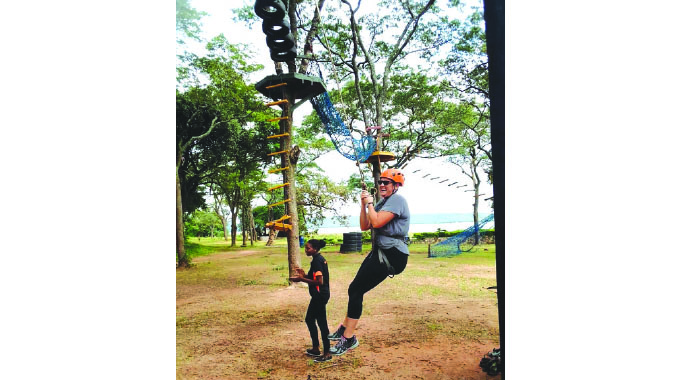Lake Chivero gets conservation boost

Jeffrey Gogo
The Zimbabwe Parks and Wildlife Management Authority (ZimParks) is working with a regional tourism company, Four Faces International, to boost conservation efforts at the Lake Chivero Recreational Park, on the outskirts of Harare.
The collaboration, formalised in a Memorandum of Agreement signed in March 2022, marks the introduction of “voluntourism” — a blend of travel and volunteer work designed to revitalise the park and grow the tourism industry.
The project runs through 2032.
“This offering will be one of the very few voluntourism projects in the country,” Mr Evans Chadyiwa, programme director and chief executive officer of Harare-based Four Faces, told The Herald Business & Finance.
“We believe this project will not only improve efficiency and conservation at the park but also contribute valuable skills transfer through the diverse range of international volunteers,” he added.
Voluntourism allows travellers to combine their love for exploration with a desire to make a positive impact in the community.
There are more than two million volunteer projects worldwide, according to available data, but only a handful in Zimbabwe. The more notable local projects are the Victoria Falls Volunteer programme, Antelope Park Lion Encounter in Gweru and the one at Imire Game Park in Marondera.
Mr Chadyiwa said the innovative programme positions Lake Chivero Park to tap into a vast pool of potential visitors, including students on gap years, wildlife enthusiasts, families seeking meaningful travel experiences, and environmentally conscious individuals.
Many operations at the park suffer from underfunding and a lack of manpower.
Illegal logging of native forests for firewood has become a blight at Chivero. Volunteer participation directly addresses these challenges, said the Four Faces founder.
Volunteer programmes tailored for impact
The Lake Chivero Volunteer initiative offers a range of options, ensuring there’s something for everyone.
Volunteers will take part in four broad programmes: Biodiversity Conservation, Estate Conservation Management, Community Based Natural Resources Management and The Ultimate Chivero Conservation Programme.
“Volunteers will be instrumental in the successful rehabilitation of Lake Chivero Park,” says Mr Chadyiwa. “Their contributions will not only enhance park infrastructure but also raise global awareness and attract international visitors.”
ZimParks spokesperson Mr Tinashe Farawu told this publication that the restoration of the Chivero Park was “progressing well” but did not provide any further details.
The project goes beyond immediate volunteer participation.
The Four Faces Environmental, Wildlife and Conservation Trust (FFEWCT) was established to manage donations specifically earmarked for park improvement projects identified by donors.
These funds will directly address equipment shortages and infrastructure upgrades, crucial for the park’s long-term viability.
The FFEWCT markets the volunteer project to a global audience, while ZimParks takes the lead in on-ground programme execution.
The collaborative approach ensures the initiative aligns with ZimParks’ conservation goals while leveraging Four Faces’ expertise in tourism and volunteer coordination.
Potential volunteers can sign up through a dedicated website, choose their programme, and book their stay. Accommodation is provided within the Park, and volunteers participate daily in their chosen efforts, working towards pre-defined objectives.
Mr Chadyiwa said to ensure volunteers contribute meaningfully, they will receive initial training grounding them in the Park’s ecosystem and the specifics of their chosen programme.
Catch them young
Meanwhile, the Chivero Park volunteer project is expanding to include local schools via the Environmental Wildlife Conservation Camps, or Environment Wildlife and Conservation (EWC) Camps.
The initiative takes a “catch-them-young” approach, offering educational projects designed to instil a sense of environmental responsibility in students from primary school through secondary and tertiary.
“The EWC Camps programme aims to achieve widespread school participation in real conservation activities, ultimately embedding environmental and wildlife conservation principles within the hearts and minds of students, and into the value systems of the institutions themselves,” Mr Chadyiwa tells us.
The EWC Camps offer a combination of learning and adventure, including hands-on wildlife and environmental conservation as well as involvement in actual research.









Comments